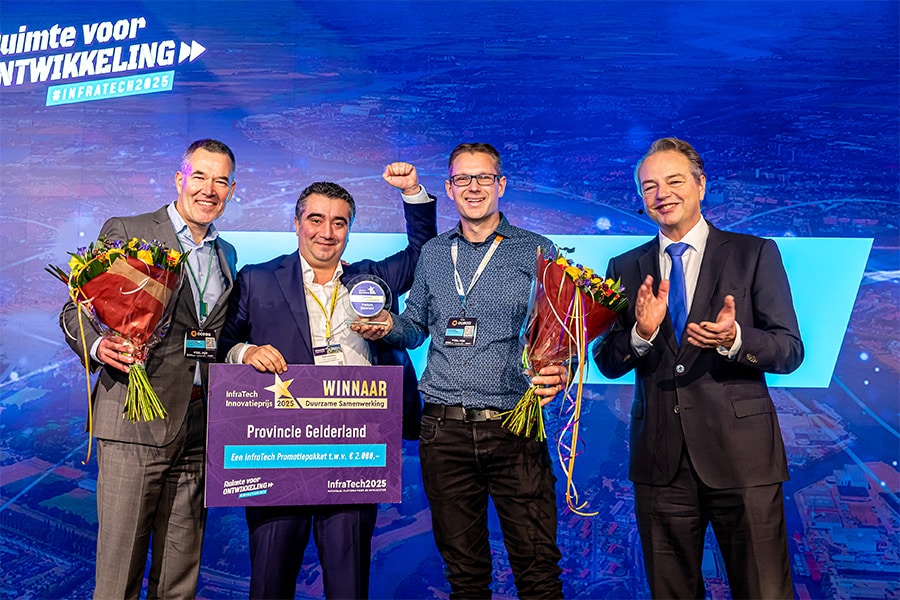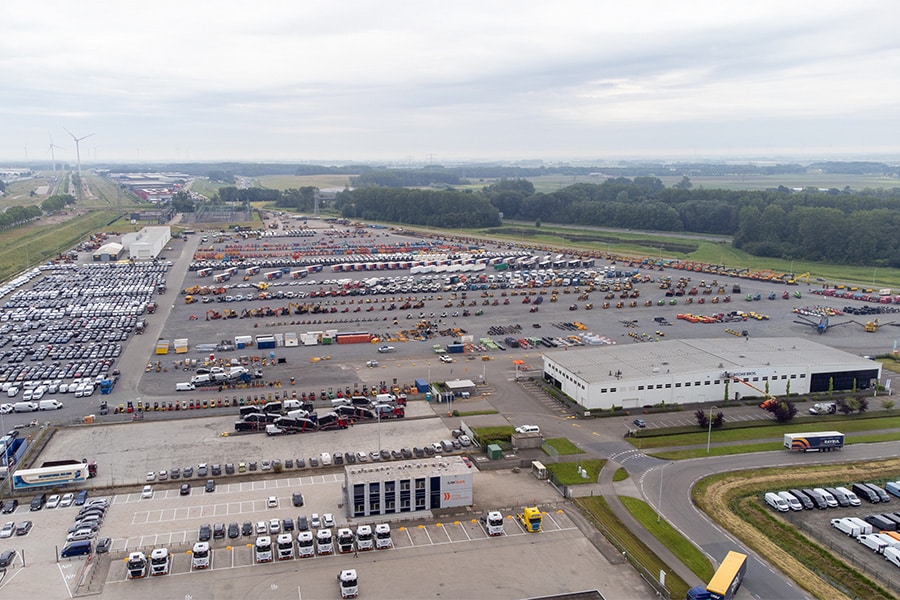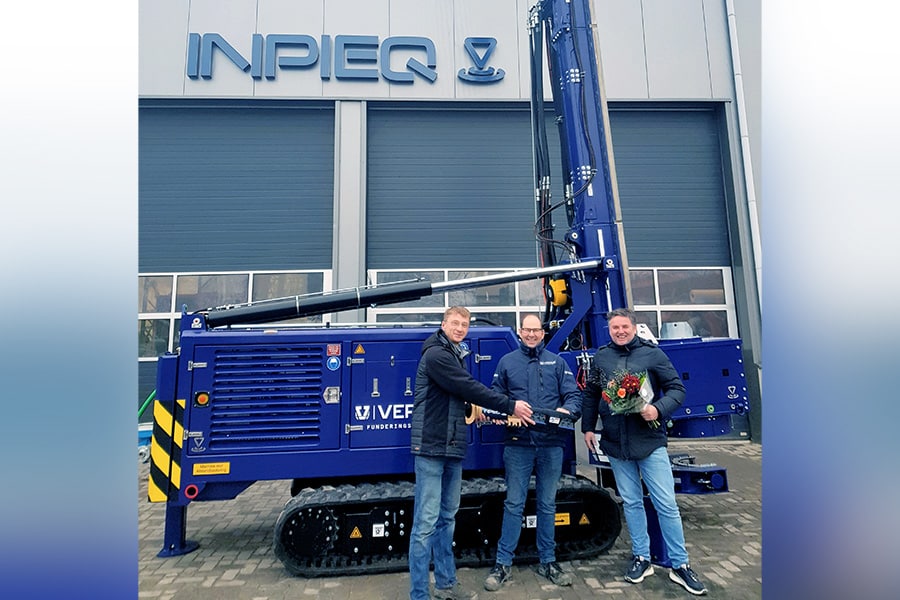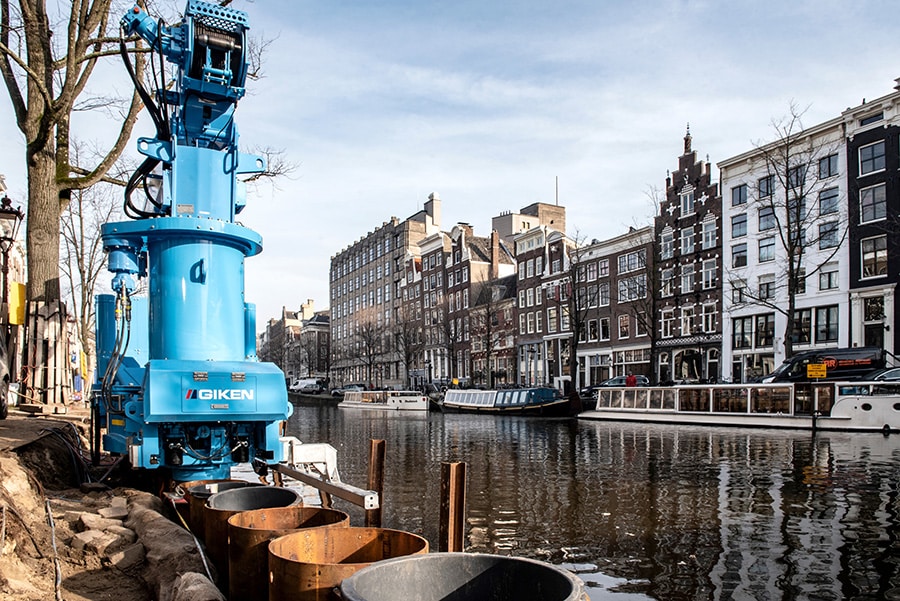
Sustainable collaboration: recycling asphalt on site
InfraTech Innovation Award 2025 - sustainable collaboration category
And the award in the sustainable cooperation category of the InfraTech Innovation Award 2025 goes to: the Asphalt Recycling Train (ART). The ART is a collection of pieces of equipment in a train that heats, loosens, mixes and spreads the asphalt again. With the ART, road surface maintenance can be done a lot more sustainably. With the ART, the old asphalt is processed into new asphalt on site, contributing to an almost completely circular form of road surface maintenance (100% reuse of materials). In addition, the ART saves emissions (an estimated 65%) because it requires significantly less construction materials to be mined or transported.
The principle of a little train that eats the old asphalt and spits it back out onto the road as new asphalt is at least 40 years old, according to Robbert Naus, manager of product development at Dura Vermeer. "It is widely used worldwide, especially on sections where there is no asphalt plant nearby. Even in the Netherlands we had an ART at the beginning of this century, but because sustainability and circularity did not play a role in calls for tender, the machine was sold at the time. With the growing demand for sustainability, we took the concept off the shelf again in 2018. And with success. A year later, we won the Rijkswaterstaat competition of market-ready innovations in sustainable asphalt with the ART, and the ball got rolling again."
Sustainable collaboration
Not only Rijkswaterstaat showed interest in ART, the province of Gelderland was also inspired by Dura Vermeer's presentation on ART at Asphalt Day 2023. The current ecosystem in which we are trapped is focused on cost, price and flat performance, whereas from a sustainable paving sector you should be more value-driven," says Fredy Sierra Fernandez, strategic advisor for sustainable road paving at Rijkswaterstaat. "In the current system, there is no incentive for on-site reuse of asphalt. That's why we decided to (help) take this on as a government. Moreover, there is room available to invest in innovations that make asphalt use more sustainable. An investor was found who has brought the ART to the Netherlands and allows contractors to work with the machine. Dura Vermeer has the knowledge to work with the ART. We funded a validation program to learn with the ART. And the province of Gelderland made test sections available. In a very natural way, we found each other and agreed to roll out the concept together."
Sustainability Strategy
The province of Gelderland has been working for many years on making building materials more sustainable, reusing building materials and reducing CO2 emissions. "In our sustainability strategy for circular infra, the focus is on two scenarios: market stimulating and scaling up," said Reinier Trommel, sustainability coordinator at Province of Gelderland. "Market-stimulating means that we invest in techniques that are not yet market-ready, but which do offer a lot of potential. On the other hand, we want to apply proven techniques widely. Both steps are necessary to make a sustainability transition, because you won't make it with existing techniques alone. The ART falls exactly in between, and came our way at the right time. Although the concept has not yet been fully validated, it is not a new technique, so rapid upscaling is a possibility."
Sample sections
In the coming period, work will be done to validate the ART, and this will require test sections. "In the Netherlands, the ART is particularly suitable for application on highways and provincial roads. That comes down to three types of surfacing," Robbert says. "At least five test sections of each of these overlays must be constructed to validate the process. The first pilot was conducted in March 2024 to test the machine, then the ART was deployed in Gelderland to replace part of the asphalt on the N315 provincial road. Now it's a matter of monitoring how the overlay behaves, and of course laying many more test sections." The latter is being met, because, according to Fredy, eight test sections have already been designated from the Department of Public Works alone. "Several municipalities and provinces have also already expressed interest," he says. "The more courses we can construct and monitor, the more we learn. We are doing it for the whole sector, all results will be made public, and the ART can be used by any contractor." A truly sustainable collaboration, in other words.



